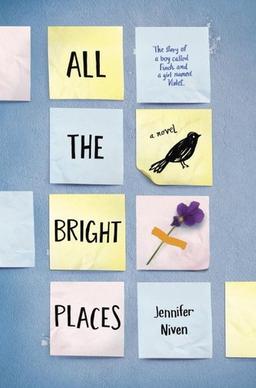 Published in 2015, Jennifer Niven's young adult debut novel All the Bright Places has made a huge impact on the lives of all its readers. This novel, which has many awards and honors attached to it, is one of the first that rawly and honestly depicted the struggles of mental health. Fans of the novel have taken it with them throughout the years, and it was the beginning of granting visibility to those who have been left out of young adult literature before. Now, we get to see that visibility come to life in the Netflix adaptation. Released in 2020, "All the Bright Places" is the story of Finch and Violet, but transformed. But what is the verdict? Is the book better than the movie? Read on for my thoughts, and, at the end, my verdict!
Published in 2015, Jennifer Niven's young adult debut novel All the Bright Places has made a huge impact on the lives of all its readers. This novel, which has many awards and honors attached to it, is one of the first that rawly and honestly depicted the struggles of mental health. Fans of the novel have taken it with them throughout the years, and it was the beginning of granting visibility to those who have been left out of young adult literature before. Now, we get to see that visibility come to life in the Netflix adaptation. Released in 2020, "All the Bright Places" is the story of Finch and Violet, but transformed. But what is the verdict? Is the book better than the movie? Read on for my thoughts, and, at the end, my verdict!Jennifer Niven is the Emmy Award-winning #1 New York Times and international bestselling author of nine books, including All the Bright Places and Holding up the Universe. Her books have been translated in over 75 languages, and All the Bright Places has won literary awards across the world, including the Goodreads Choice Award for Best Young Adult Fiction of 2015. It was named a Best Book of the Year by Time Magazine, NPR, the Guardian, Publisher's Weekly, YALSA, Barnes & Noble, BuzzFeed, the New York Public Library, and others, and was the #1 Kids' Indie Next Book for Winter '14-'15. The film starring Elle Fanning, Justice Smith, Luke Wilson, and Keegan-Michael Key is currently on Netflix, with a script by Jennifer and Liz Hannah. Liz Hannah is an American screenwriter and producer. She is best known for her work on Steven Spielberg's 2017 journalism drama The Post for which she was nominated for a Golden Globe for Best Screenplay.
TW: mentions of suicide and mental illness and trauma
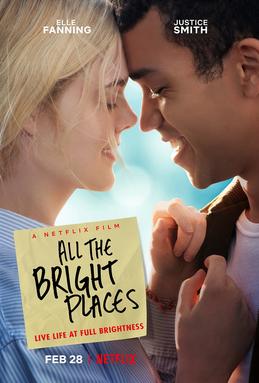 When Finch and Violet meet on the ledge of the bell tower at school--six stories above the ground--it's unclear who saves whom. And when the unlikely pair teams up on a class project to discover the "natural wonders" of their state, they go, as Finch says, where the road takes them: the grand, the small, the bizarre, the beautiful, the ugly, the surprising--just like life. Soon it's only with Violet that Finch can be himself--a bold, funny, live-out-loud guy, who's not such a freak after all. And it's only with Finch that Violet forgets to count away the days and starts living them. But as Violet's world grows, Finch's begins to shrink. This is a heart-wrenching, unflinching story of love shared, life lived, and two teens who find one another while standing on the edge.
When Finch and Violet meet on the ledge of the bell tower at school--six stories above the ground--it's unclear who saves whom. And when the unlikely pair teams up on a class project to discover the "natural wonders" of their state, they go, as Finch says, where the road takes them: the grand, the small, the bizarre, the beautiful, the ugly, the surprising--just like life. Soon it's only with Violet that Finch can be himself--a bold, funny, live-out-loud guy, who's not such a freak after all. And it's only with Finch that Violet forgets to count away the days and starts living them. But as Violet's world grows, Finch's begins to shrink. This is a heart-wrenching, unflinching story of love shared, life lived, and two teens who find one another while standing on the edge.
Before I dove into this movie, I reread the book. It was just as stunning and heartbreaking as I remembered it being. As I was reading, I asked questions about how or would the movie portray some of these things. I asked: how will the movie convey the passage of time? How will the movie capture both Finch's and Violet's voices, if at all? How will the movie portray mental illness? As I dive into the analyzation of the adaptation, the answers to all of these things will, to me, show me how well the movie captured the story within the pages.
 For those familiar with the book, the passage of time is crucial to understanding how the characters grow and fall apart. Violet, after the death of her sister, is obsessed with just letting the days get behind her, until she realizes she has to make the days/moments count. This is reflected in how, under her name that signifies we're switching to her point of view, she starts with "x days till graduation", which transforms until "March x" or "May x-x". Finch, on the other hand, denotes days passing by how many consecutive days he's Awake, usually written as "Day x of the Awake" or something similar. As the characters evolve, their sense of time and the passage of it evolves. We don't get to see anything like this in the movie. Not even Violet crossing off the days on her calendar. Not even Finch counting the days he's been Awake. It was, honestly, my first disappointment when watching this movie. I know that obviously it is a movie, and only so much time can be allotted to specific things, but this passage of time concept is such a small thing that has a huge, huge meaning. Not only does it help us understand the characters' growth, but also the timeline of the story itself. Near the end of the movie, everything leading up to Finch's suicide escalated quickly. When we reached the moment where Violet discovers where he is, it feels like a massive shock. In the book, though, we understand (or can at least attempt to understand) how he got there. This also has major implications in how the movie portrayed mental illness - implications that could have been lessened, perhaps, had the movie makers attempted to portray the passage of time and the subsequent growth/falling apart of Finch and Violet.
For those familiar with the book, the passage of time is crucial to understanding how the characters grow and fall apart. Violet, after the death of her sister, is obsessed with just letting the days get behind her, until she realizes she has to make the days/moments count. This is reflected in how, under her name that signifies we're switching to her point of view, she starts with "x days till graduation", which transforms until "March x" or "May x-x". Finch, on the other hand, denotes days passing by how many consecutive days he's Awake, usually written as "Day x of the Awake" or something similar. As the characters evolve, their sense of time and the passage of it evolves. We don't get to see anything like this in the movie. Not even Violet crossing off the days on her calendar. Not even Finch counting the days he's been Awake. It was, honestly, my first disappointment when watching this movie. I know that obviously it is a movie, and only so much time can be allotted to specific things, but this passage of time concept is such a small thing that has a huge, huge meaning. Not only does it help us understand the characters' growth, but also the timeline of the story itself. Near the end of the movie, everything leading up to Finch's suicide escalated quickly. When we reached the moment where Violet discovers where he is, it feels like a massive shock. In the book, though, we understand (or can at least attempt to understand) how he got there. This also has major implications in how the movie portrayed mental illness - implications that could have been lessened, perhaps, had the movie makers attempted to portray the passage of time and the subsequent growth/falling apart of Finch and Violet. 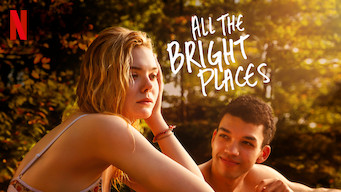 My second question pertained to how the movie would capture Finch's and Violet's voices, if at all. The book is told in the alternating first person POVs of Violet and Finch, so voice is a huge part in understanding Violet's grief, Finch's trauma, and how they both interact with the world around them. In a movie, voice can be captured, especially through voice-overs or close-up moments with the characters. We get none of that in "All the Bright Places." In fact, I felt sort of separated from this world that I was immersed in when I read the novel. Could that be attributed to the difference in mediums? Perhaps, but I think we can all think of movies that have a strong voice, or a strong main character, through which we get pulled into the narrative of the story. The problem with this story is that there's two main characters, with two strong voices. It seemed like no one made a true decision on who to follow, and thus neither of the characters' voices got to develop strongly in the movie. I felt like a viewer, just watching from the outside, but lacking the true understanding and empathy for the characters that I felt in the book. I am also going to combine this feeling with how we don't get a true deep dive into Finch at all. The book works because we get intimate with how Finch thinks, even if we don't get to ever truly know him. Instead, the movie is more Violet-centric, and Finch is just kind of someone we watch from afar, and never really get to know. The movie, at the end, tries to give itself some credit for doing that (Violet gives a whole speech about how "it wasn't her job to save Finch" which is true, but something that wasn't in the novel, and thus not one of the bigger themes of the book in my opinion). But understanding Finch, knowing his voice is half the reason this book's portrayal of mental health is so powerful and impactful. The lack of balance, and the lack of simultaneous exploration relating to the characters and their voices in the movie was the second disappointment.
My second question pertained to how the movie would capture Finch's and Violet's voices, if at all. The book is told in the alternating first person POVs of Violet and Finch, so voice is a huge part in understanding Violet's grief, Finch's trauma, and how they both interact with the world around them. In a movie, voice can be captured, especially through voice-overs or close-up moments with the characters. We get none of that in "All the Bright Places." In fact, I felt sort of separated from this world that I was immersed in when I read the novel. Could that be attributed to the difference in mediums? Perhaps, but I think we can all think of movies that have a strong voice, or a strong main character, through which we get pulled into the narrative of the story. The problem with this story is that there's two main characters, with two strong voices. It seemed like no one made a true decision on who to follow, and thus neither of the characters' voices got to develop strongly in the movie. I felt like a viewer, just watching from the outside, but lacking the true understanding and empathy for the characters that I felt in the book. I am also going to combine this feeling with how we don't get a true deep dive into Finch at all. The book works because we get intimate with how Finch thinks, even if we don't get to ever truly know him. Instead, the movie is more Violet-centric, and Finch is just kind of someone we watch from afar, and never really get to know. The movie, at the end, tries to give itself some credit for doing that (Violet gives a whole speech about how "it wasn't her job to save Finch" which is true, but something that wasn't in the novel, and thus not one of the bigger themes of the book in my opinion). But understanding Finch, knowing his voice is half the reason this book's portrayal of mental health is so powerful and impactful. The lack of balance, and the lack of simultaneous exploration relating to the characters and their voices in the movie was the second disappointment. 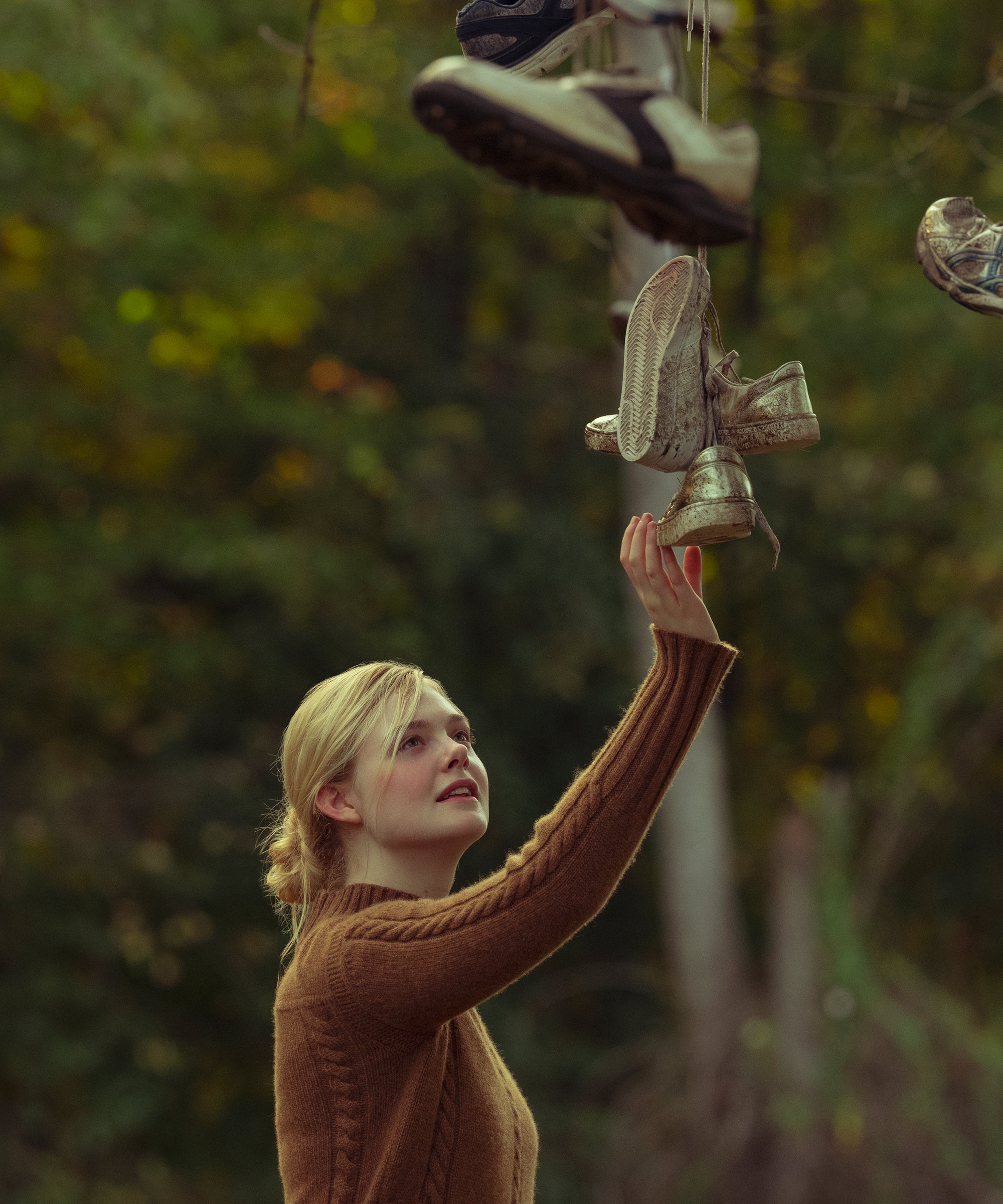 Mental illness is a huge part of this story, of the novel's success, and yet is so glossed over in the movie (compared to the novel - I do want to make that distinction here). All the Bright Places is drawn from Niven's own personal experiences. In the novel, we see a true breakdown of how Violet struggles and then recovers, and how Finch goes about his days one day at a time. In the movie, we get nothing like that. We do see Finch talk to Mr. Embry (Embryo), and while the dialogue between the two isn't the same, the dynamic is perfect. But other than that, Finch doesn't really discuss with anyone how he's feeling other than Violet. We as viewers don't get to know what's running through his head, which is majority of how we get to know and analyze Finch's character. It's how we get to see his progression from good days to bad days, how he "gets" during his dark moods, and some of his last moments before his suicide. Another one of the big things the movie just didn't include was Finch's dynamic with his family. He has a mother who neglects him, and a father who abuses him. In the movie, both of those characters are cut out. We don't get to see that Finch probably inherited his mental illness from his father, or that his father's abuse and mother's neglect doesn't help his mental state. We don't get the portrayal of his family not really caring about him, or how they wouldn't even go after him when they suspected what happened. Instead, the mom is away on business and the dad is just absent. This is the decision that frustrates me the most, especially since we get to see more of Violet's family in the movie than the book. Finch's family (their absence, neglect, abuse) is more important to the story than Violet's, but we get to see Violet's most likely because her home situation is more "wholesome." Her parents love her, her parents are struggling, her parents are protective and supportive, and they aren't pretending to forget Eleanor. Going back to Finch and his suicide, there is just no depth to the actual thoughts behind his actions - at least, these are things that we don't get to see as moviegoers. The actions just happen, and we don't get a whole lot of explanation, or way to understand or grapple with the true complexity behind it all.
Mental illness is a huge part of this story, of the novel's success, and yet is so glossed over in the movie (compared to the novel - I do want to make that distinction here). All the Bright Places is drawn from Niven's own personal experiences. In the novel, we see a true breakdown of how Violet struggles and then recovers, and how Finch goes about his days one day at a time. In the movie, we get nothing like that. We do see Finch talk to Mr. Embry (Embryo), and while the dialogue between the two isn't the same, the dynamic is perfect. But other than that, Finch doesn't really discuss with anyone how he's feeling other than Violet. We as viewers don't get to know what's running through his head, which is majority of how we get to know and analyze Finch's character. It's how we get to see his progression from good days to bad days, how he "gets" during his dark moods, and some of his last moments before his suicide. Another one of the big things the movie just didn't include was Finch's dynamic with his family. He has a mother who neglects him, and a father who abuses him. In the movie, both of those characters are cut out. We don't get to see that Finch probably inherited his mental illness from his father, or that his father's abuse and mother's neglect doesn't help his mental state. We don't get the portrayal of his family not really caring about him, or how they wouldn't even go after him when they suspected what happened. Instead, the mom is away on business and the dad is just absent. This is the decision that frustrates me the most, especially since we get to see more of Violet's family in the movie than the book. Finch's family (their absence, neglect, abuse) is more important to the story than Violet's, but we get to see Violet's most likely because her home situation is more "wholesome." Her parents love her, her parents are struggling, her parents are protective and supportive, and they aren't pretending to forget Eleanor. Going back to Finch and his suicide, there is just no depth to the actual thoughts behind his actions - at least, these are things that we don't get to see as moviegoers. The actions just happen, and we don't get a whole lot of explanation, or way to understand or grapple with the true complexity behind it all.  I am not an expert on how to talk about mental health, or how to talk about the sensitive topics of grief and trauma, but I can recognize that this movie doesn't touch on these topics as gracefully as the book does. Because of my not-expert status, I have decided to include some other reviews and phrases from reviews that I happen to agree with regarding the portrayal of mental health. The three related articles are linked.
I am not an expert on how to talk about mental health, or how to talk about the sensitive topics of grief and trauma, but I can recognize that this movie doesn't touch on these topics as gracefully as the book does. Because of my not-expert status, I have decided to include some other reviews and phrases from reviews that I happen to agree with regarding the portrayal of mental health. The three related articles are linked. - "Even as the movie tries, it seems to make a statement against suicide, its moody, angst-ridden stars arguable still glorify taking one's own life." Kristen Smith for Plugged In
- 'All the Bright Places' Review: A Mediocre Movie with an Important Message, article by Zoe Klein for The Daily Cardinal
- "Even in today's era when mental health is finally receiving the attention it deserves, black people are often left out of the conversation. So, it's refreshing, and even cathartic, to see a young adult narrative explore how that affects black teens like Theodore who are struggling. But as progressive as "All the Bright Places" is in that respect, Theodore's storyline is not always handled with the depth it should receive." Candice Frederick for The New York Times.
While I was watching, I did take note of several interesting and important changes. Here's a list of some of the most important ones, and my thoughts regarding them.
- Finch and Violet meet on the ledge of the bridge where Eleanor died. I liked this change, because it directly associated Violet's grief with her sister, and allowed the movie to easily construct the narrative surrounding Eleanor and her death. This is mostly achieved by having Finch research and ask around, which I think is more time-effective than having Violet just explain it to us in bits and pieces as she does during the whole movie (better to have the whole truth revealed at the beginning, is what I'm trying to say).
- Finch is closer with his sister, Kate, as evidenced by a secret handshake and their always saying "I love you" to one another. However, there is no Decca, who is probably the most iconic fictional little sister. It's not everyday you find your little sister sitting around and cutting up all the sad parts of the novel. That was a powerful moment that the movie didn't portray, because Decca didn't exist in the movie universe.
- Regarding Amanda: she doesn't "lie" about the sleepover at the beginning, and flat-out says that it's a party. I like her honesty. On the other hand, she doesn't tell Violet about seeing Finch at the support group before Finch dies. I liked this change better, because it portrayed Amanda as a character who cared about other people - she tells the truth to her friends, and keeps the personal secrets of others. Did Amanda make the right choice in the book or in the movie, by telling or not telling? We will never know, but I appreciated Amanda's character more in the movie.
- Roamer in the movie seems like the combined book characters of Roamer + Ryan Cross. I have no qualms with this, and I actually thought it was kind of genius. I also enjoyed the moment where Roamer in the movie is talking to Violet and he almost tells her to "get over it" - it was a a really well done scene.
- The moments between Finch and Violet are overall well done. Even though the dialogue and the timing of their relationship is different than in the book, the dynamic between the two is spot on. They wander to more of the same spots, Finch kicks over his desk to divert attention, they quote Virginia Woolf back and forth, their dialogue overlays some bike riding scenes, and their first kiss are all recognizable moments. There were some key differences, though, that I would like to mention:
- Violet never explains that the one place she would go would be to California of the past, because that's one of the places she'd be with Eleanor. That's a super important moment for her, to admit that to Finch, and it is glossed over in the movie.
- There is no incessant flirting before the first kiss. It honestly makes the first kiss seem like born out of the fact that they can only share their traumas with one another, versus the fact that they actually like one another, too. Since we only see them share their traumas, and not any of the other stuff too, it just feels like an unnatural progression.
- In the movie, Finch doesn't leave behind all of the extra wanderings for Violet. That is the best part of the novel, and the point where Violet learns the most about grief, tragedy, and life. It's disappointing that the movie only includes the one, but I am glad that we do get to see the two of them going to some of the extra wanderings before he dies (like the shoe tree).
- The movie has a greater emphasis on Finch's and Violet's actual romantic relationship, which is definitely for entertainment value. I have conflicting feelings about this. In one sense, it's a good portrayal of how the two characters can have sex without any of the preconceived notions other YA movies take care to explain (i.e. have you done this before, protection, etc.). On the other hand, the book actually does take care to explain those things, and Niven actually picks apart why those things are so important to people at that age, or why they're so scary. It just felt strange, to me, that there would be a greater emphasis on kissing and the physicality of their relationship, but all the other important stuff (like talking about it with friends, or having the conversation about wants beforehand) was cut.
- Violet drives a car again for the first time, not to see Finch, but to go find him. I definitely liked this decision better, because I think it was more urgent. Violet is not a girl who wants the car to sneak around with her boyfriend -- this reason isn't big enough for her to get in a car, the machine that killed her sister. Instead, she gets in to go find Finch, who might be in trouble and who needs her, since she's the only one who cares. I liked this depiction a lot more.
- There is no Germ magazine subplot. This is a great subplot, because this is one of the ways in which we see Violet start to get back on the horse that is life and use her trauma and confusion and grief to make something beautiful.
- The "tying together moment" of how Violet and Finch discuss what their epitaphs would be, and then Finch's use of their epitaph in the church guests book is a truly stunning and well done moment. I always appreciate the small-turned-big moments.
- Lastly, a similarity I noticed. I wrote this adaptaiton review after I reviewed the adaptation of John Green's Looking for Alaska. In the tv series and book, readers aren't with Alaska in her last moments. We aren't in the car with her, and we have no idea what's running through her head that night. Similarly, in All the Bright Places, we aren't with Finch in his final days, or when he decides to go to the lake. In the movie, this is also true, and is the only moment that I think was correctly done by not staying close to the characters.
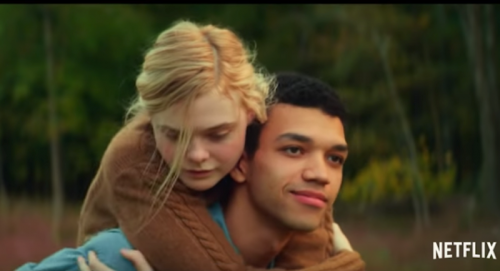

*This review is also posted on my Goodreads page*
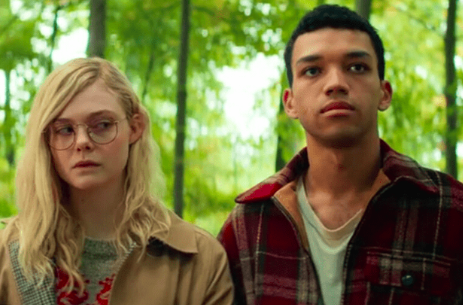
Comments
Post a Comment